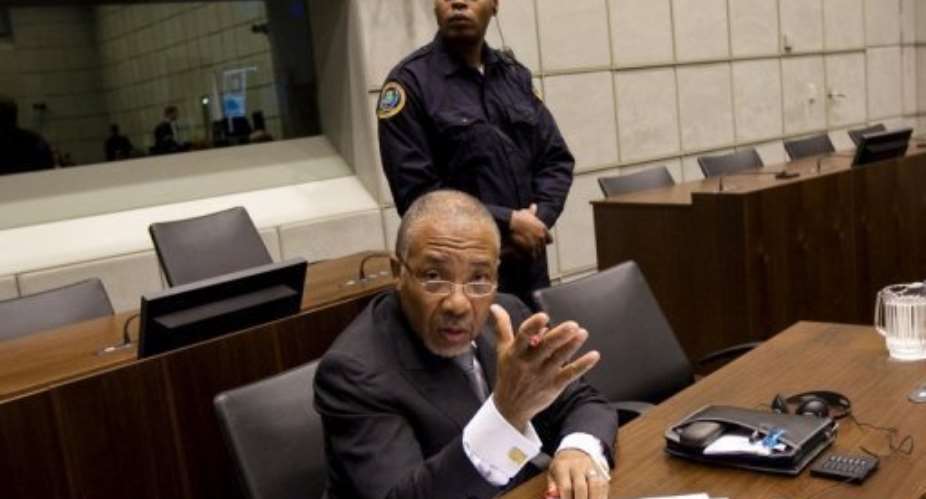LEIDSCHENDAM, Netherlands (AFP) - An international court opened on Thursday its judgement hearing for Liberian ex-president Charles Taylor, accused of arming Sierra Leone's rebels who paid him in "blood diamonds".
Dressed in a dark suit and white shirt and red tie, Taylor listened attentively and made notes as judge Richard Lussick started reading a summary of the verdict -- the first ever against a former head of state by an international court -- at the Special Court for Sierra Leone, based in Leidschendam outside The Hague.
The reading will be screened at the SCSL's main headquarters in the west African country's capital Freetown, from where his case was moved in 2006 over security fears.
Taylor, 64, is accused of helping Sierra Leone's Revolutionary United Front (RUF) rebels wage a terror campaign during a civil war that claimed 120,000 lives between 1991 and 2001.
His trial, which saw model Naomi Campbell testify she had received diamonds from the flamboyant Taylor and gruesome testimony from victims, wrapped up in March 2011.
If found guilty, Taylor could be sentenced in four to six weeks.
Nigerian authorities arrested Taylor in March 2006 when he tried to flee from exile in Nigeria after stepping down as Liberian president three years earlier in a negotiated end to a civil war in his own country.
He was transferred to the SCSL in Freetown, but in June 2006 a UN Security Council resolution cleared the way for him to be transferred to The Hague, saying his presence in west Africa was an "impediment to stability and a threat to the peace."
"There is a wave of anticipation ahead of the judgment," Alpha Sesay, legal officer at the Open Society's Justice Initiative in The Hague, told AFP on Wednesday.
"Not only in The Hague, but in Sierra Leone and in Liberia as well -- by victims of the conflict, by the countries' governments and by Taylor's supporters," he said adding: "Finally, it will be good to know."
Prosecutors alleged that the RUF paid Taylor with illegally mined so-called blood diamonds worth millions, stuffed into mayonnaise jars.
During the trial, prosecutor Brenda Hollis told the court: "Charles Taylor created, armed, supported and controlled the RUF in a 10-year campaign of terror against the civil population of Sierra Leone."
As president of neighbouring Liberia, he acted as "chief, father and godfather to his proxy rebel forces in Sierra Leone," prosecutors added.
The former warlord has pleaded not guilty to 11 counts, dismissing the allegations as "lies" and claiming to be the victim of a plot by "powerful countries."
During Taylor's trial which began on June 4, 2007, some 94 witnesses took the stand for the prosecution and 21 for the defence. Taylor himself testified for 81 hours.
British supermodel Naomi Campbell and actress Mia Farrow gave headline-grabbing evidence in August 2010 about a gift of "dirty" diamonds Taylor gave to Campbell at a charity dinner hosted by then South African president Nelson Mandela in 1997.
Judges also heard gruesome testimony from victims of the Sierra Leone conflict, including a witness who said he pleaded with RUF rebels to cut off his remaining hand so they would spare his toddler son.
Others said Taylor's fighters strung human intestines across roads, removed foetuses from women's wombs and practised cannibalism, while children younger than 15 were enlisted to fight.
One witness said he was present when the Liberian leader ate human liver.
During his own testimony, which began in July 2009, Taylor called the trial a "sham" and denied allegations he ever ate human flesh.
Nigerian authorities arrested Taylor in March 2006 when he tried to flee from exile in Nigeria after stepping down as Liberian president three years earlier in a negotiated end to a civil war in his own country.
He was transferred to the SCSL in Freetown, but in June 2006 a UN Security Council resolution cleared the way for him to be transferred to The Hague, saying his presence in west Africa was an "impediment to stability and a threat to the peace."
The court, set up jointly by the Sierra Leone government and the United Nations, has already convicted eight Sierra Leoneans of war crimes and jailed them for between 15 and 52 years after trials in Freetown.





 Dumsor: Don't rush to demand timetable; the problem may be temporary — Atik Moha...
Dumsor: Don't rush to demand timetable; the problem may be temporary — Atik Moha...
 Space X Starlink’s satellite broadband approved in Ghana — NCA
Space X Starlink’s satellite broadband approved in Ghana — NCA
 2024 election will be decided on the grounds of the economy; choice of running m...
2024 election will be decided on the grounds of the economy; choice of running m...
 Dumsor: We're demanding less; just give us a timetable — Kwesi Pratt to ECG
Dumsor: We're demanding less; just give us a timetable — Kwesi Pratt to ECG
 Do I have to apologise for doing my security work, I won’t – Simon Osei-Mensah r...
Do I have to apologise for doing my security work, I won’t – Simon Osei-Mensah r...
 All my businesses have collapsed under Akufo-Addo — NDC Central regional chair
All my businesses have collapsed under Akufo-Addo — NDC Central regional chair
 Military, Prison Officers clash in Bawku, three injured
Military, Prison Officers clash in Bawku, three injured
 GRA-SML contract: MFWA files RTI request demanding KPMG report
GRA-SML contract: MFWA files RTI request demanding KPMG report
 Court threatens to call second accused to testify if NDC's Ofosu Ampofo fails to...
Court threatens to call second accused to testify if NDC's Ofosu Ampofo fails to...
 Family accuses hospital of medical negligence, extortion in death of 17-year-old...
Family accuses hospital of medical negligence, extortion in death of 17-year-old...
